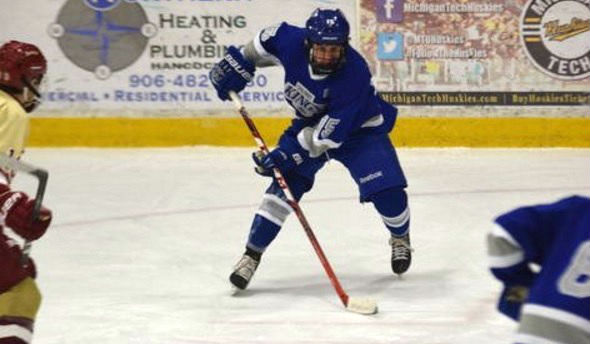
Performance: Calumet's Rory Anderson
January 13, 2017
 Rory Anderson
Rory Anderson
Calumet senior – Hockey
Calumet may be Michigan’s northernmost high school, but its hockey program is known well from Lake Superior to the Ohio and Indiana borders – and earned plenty of respect again by downing Division 2 No. 5 Novi 5-1 last Friday and Division 1’s formerly top-ranked Brighton 4-1 on Saturday. Copper Kings captain Anderson led the way with a goal in both games plus a combined three assists and some valuable checking to earn the Michigan National Guard “Performance of the Week.”
Anderson is a returning all-stater and his team’s leading scorer for the second straight season, this winter with nine goals and 13 assists and a +5 rating (his team has scored five more goals than it’s given up with him on the ice) over 12 games. He had 49 points as a junior and 27 as a sophomore and for his career has 40 goals and 58 assists over 63 games. Neither Brighton nor Novi’s top lines scored during his time on the ice over the weekend, and as a result of those wins the Copper Kings moved up from No. 10 in Division 3 to No. 7 and improved to 6-5-1 after starting this season 0-4.
 A three-sport athlete, Anderson will play shortstop, catcher and do some pitching this spring for the baseball team, and also made the media-selected all-Upper Peninsula Dream Team in football this fall helping Calumet set a school record for wins in finishing 10-2. He ran for 741 yards and 16 touchdowns and also averaged 34.3 yards per kick return with two more scores. He’s undecided what he’ll do after high school but would be interested in continuing his athletic career; first though, Anderson is focused on carrying the hockey team deep into the postseason after his Copper Kings fell in the postseason's first round last winter to Houghton and then watched neighbor Hancock emerge from their Regional to win its first MHSAA championship since 1999.
A three-sport athlete, Anderson will play shortstop, catcher and do some pitching this spring for the baseball team, and also made the media-selected all-Upper Peninsula Dream Team in football this fall helping Calumet set a school record for wins in finishing 10-2. He ran for 741 yards and 16 touchdowns and also averaged 34.3 yards per kick return with two more scores. He’s undecided what he’ll do after high school but would be interested in continuing his athletic career; first though, Anderson is focused on carrying the hockey team deep into the postseason after his Copper Kings fell in the postseason's first round last winter to Houghton and then watched neighbor Hancock emerge from their Regional to win its first MHSAA championship since 1999.
Coach Dan Giachino said: “Rory is important to our team for many reasons. Not only has he been our leading scorer for the past two seasons, but he has been one of our best defensive forwards. Rory's line is consistently matched up against the opposing team's top line, and he continually does an excellent job keeping the opposing top line off the scoresheet. Rory's work ethic is always apparent at practice, and he has learned over the past two years that he has the ability to push his linemates with his hard work. … Off the ice, Rory is 3.0 student and has a great presence in the locker room. As a junior, he was named assistant captain, and this year, he was a natural fit to be our captain. Our coaching staff is always pushing kids to be 'quietly confident' in their abilities, and Rory has been a player that brings that to the locker room each day.”
Performance Point: “It was all around a good weekend,” Anderson said. “Everyone was playing hard … it wasn’t just me doing everything, but my players around me, my teammates helping me out and me helping them out. (The highlight) I think was making the play for the go-ahead goal against Brighton, to make us go ahead 2-1, passing it over to Scotty Loukus. I got the puck in the defensive zone, and I thought to myself that I needed to get it out. I chipped it to Scotty, he gave it back to me, and I saw the open ice. I was patiently waiting on the side boards, and then I gave it back to him.”
Handing off success: “There’s quite a few guys who also played football, and after the season we had there on the football team we carried a lot of momentum going into hockey season. It's just the things we do in football, the leadership and everything, that carries over and that’s what we want. To be honest, some of us players didn’t really (expect the football success) at the beginning of the season, but once we started going, we got a good idea we could go far, and that’s what we did. I think we could have a really good (hockey) run, for my last year. We have a good team.”
 Captain Anderson: “It’s a big role to fill. With all the guys there, all the seniors there, and a new (captain) that’s picked, it’s tough. But it’s fun too. I keep all the guys together, just being vocal on the benches and in the locker room and during practice. (It’s) just talking, helping the kids who it might be their first year there.”
Captain Anderson: “It’s a big role to fill. With all the guys there, all the seniors there, and a new (captain) that’s picked, it’s tough. But it’s fun too. I keep all the guys together, just being vocal on the benches and in the locker room and during practice. (It’s) just talking, helping the kids who it might be their first year there.”
Bigger, faster, smarter: “During the offseason, I put in a lot of work lifting, and I think I’ve gotten a lot faster and smarter. Just watching other people, watching what they do at higher levels, and carrying that to my level, I think it’s made me smarter – what to do without the puck, moving around to get open so other people can get me the puck, and then when I have the puck where to skate and what to do with it. I really like watching (the Washington Capitals’) T.J. Oshie. The things he does, he’s a big hitter, he can play the body and he also does a lot of stuff with the puck.”
If Hancock can do it: “After watching them go on their state run, we just kinda figured if they can do it, we can do it. Watching them go to the Finals, it’s a local team and you’re always paying attention to what other teams around the area are doing. I know just about every single one of them, and I think most people wanted to see them go far.
- Geoff Kimmerly, Second Half editor
Every week during the 2016-17 school year, Second Half and the Michigan National Guard will recognize a “Performance of the Week" from among the MHSAA's 750 member high schools.
The Michigan Army National Guard provides trained and ready forces in support of the National Military Strategy, and responds as needed to state, local, and regional emergencies to ensure peace, order, and public safety. The Guard adds value to our communities through continuous interaction. National Guard soldiers are part of the local community. Guardsmen typically train one weekend per month and two weeks in the summer. This training maintains readiness when needed, be it either to defend our nation's freedom or protect lives and property of Michigan citizens during a local natural disaster.
Previous 2016-17 honorees:
Dec. 15: Demetri Martin, Big Rapids basketball – Read
Dec. 1: Rodney Hall, Detroit Cass Tech football – Read
Nov. 24: Ally Cummings, Novi volleyball – Read
Nov. 17: Chloe Idoni, Fenton volleyball – Read
Nov. 10: Adelyn Ackley, Hart cross country – Read
Nov. 3: Casey Kirkbride, Mattawan soccer – Read
Oct. 27: Colton Yesney, Negaunee cross country – Read
Oct. 20: Varun Shanker, Midland Dow tennis – Read
Oct. 13: Anne Forsyth, Ann Arbor Pioneer cross country – Read
Oct. 6: Shuaib Aljabaly, Coldwater cross country – Read
Sept. 29: Taylor Seaman, Brighton swimming & diving – Read
Sept. 22: Maggie Farrell, Battle Creek Lakeview cross country – Read
Sept. 15: Franki Strefling, Buchanan volleyball – Read
Sept. 8: Noah Jacobs, Corunna cross country – Read
PHOTOS: (Top) Calumet's Rory Anderson prepares to receive the puck during a game last season. (Middle) Anderson looks for an opening after taking a hand-off during football season this fall. (Photos courtesy of the Calumet athletic department.)
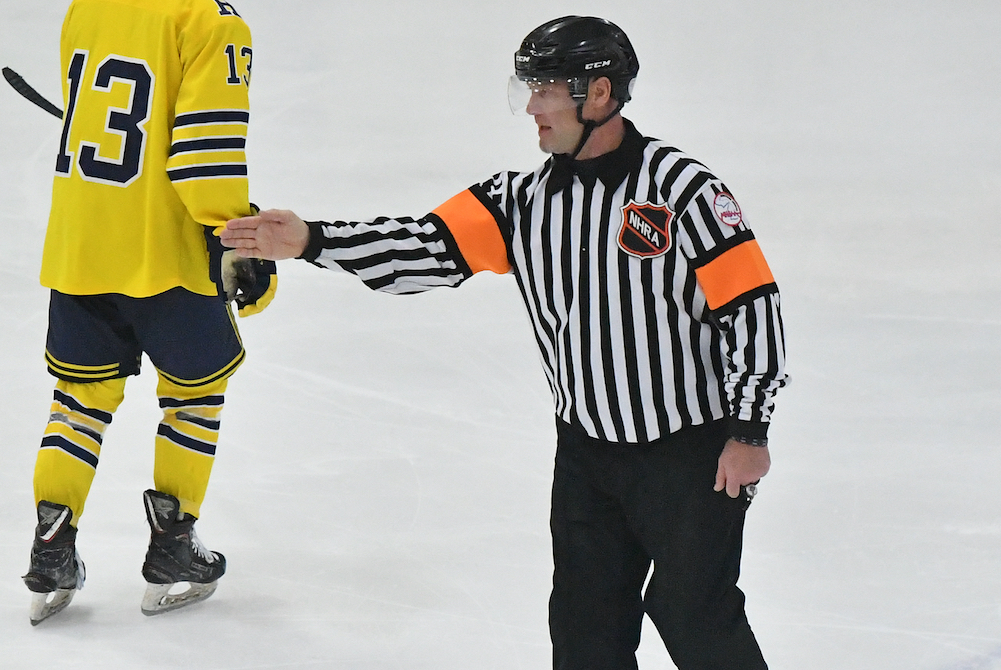
Retired NHL-er Back on Ice to Answer Call - By Making Them
By
Rob Kaminski
MHSAA benchmarks editor
March 16, 2023
The most accomplished skater on the ice during Friday’s triple-overtime MHSAA Division 1 Semifinal hockey thriller between Hartland and Brighton was not wearing the school colors of either team.
In front of a packed house at Plymouth’s USA Hockey Arena, referee Bryan Smolinski was in stripes, just like the rest of his officiating crew.
In his former life, he pulled on plenty of sweaters before lacing up the skates. That happens when one logs more than 1,000 games, tallies nearly 300 goals (274) and close to 400 assists (377) with eight teams spanning a 15-year playing career in the National Hockey League.
So, how did the 52-year-old former star player find himself on the ice last weekend as one of the referees for the pinnacle weekend of this high school season? Good question, even for the man known as “Smoke” during his playing days.
“I was working in youth development programs a few years back and reached out to some Michigan guys I had connections with about other ways to help the game,” Smolinski said. “I called Kevin May just to chat and asked, ‘Hey, how’s your reffing going?’ He said, ‘You know, we’re down a little bit,’ then said, ‘Why don’t you do it?’ I said, ‘Not a chance,’” Smolinski laughed.
Never Say Never
May persisted, imploring his friend to skate with him during a Fall league at Cranbrook in Bloomfield Hills. After eight weeks, once a week, Smolinski had a revelation.
“I’m like, ‘I’m kind of diggin’ this,’” Smolinski said “So, I did all the testing, and the educational part of it, and I really enjoyed it. I got with Danny (DiCristofaro) and his group, and he put me in as much as he could, and I really started to get my feet wet.”
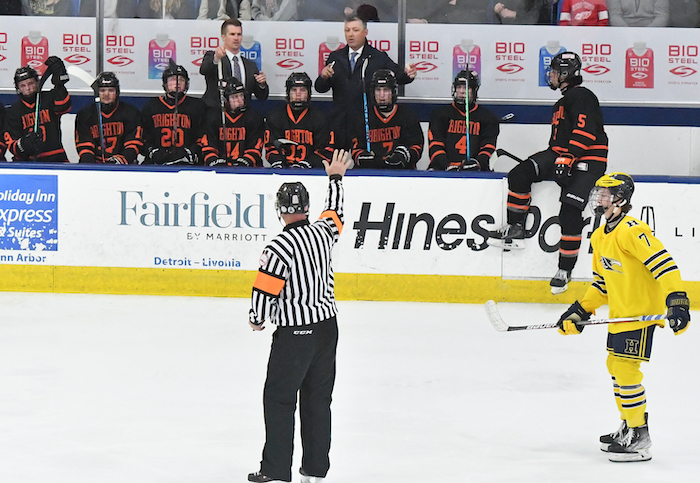 DiCristofaro is the assigner and referee-in-chief for the MHSAA’s Northeast Hockey Referees Association, and he has seen Smolinski’s growth first-hand.
DiCristofaro is the assigner and referee-in-chief for the MHSAA’s Northeast Hockey Referees Association, and he has seen Smolinski’s growth first-hand.
“Obviously he’s got great instincts and a feel for the game, along with a wealth of experience, all of which has allowed him to climb the ladder quickly,” said DiCristofaro. “It’s been a joy to watch his growth as an official.”
Fast forward to last Friday, and there were Smolinski and May sharing duties as referees during the MHSAA Semifinal with linesmen Michael Andrews and Thomas Robbins.
In between, there has been a learning curve that still continues, but the jump to officiating was not quite as daunting as his introduction to the NHL.
“I was scared to death. My first game was against Mario Lemieux. I’m in the old Boston Garden and now I’m playing against these guys and it’s their job, and they’re out there trying to make a living,” Smolinski recalled.
The emotions were not running nearly as frenzied for his first game as an MHSAA official, obviously, yet respect came in a different form.
“I couldn’t pick the puck up, I was breathing heavily; it was Kevin and me doing a two-man game in Brighton,” Smolinski recalled. “There were a few high-end kids playing, and I’m thinking, ‘I’m dying here.’ You know, there’s no training for that first time.”
What that experience did, however, was revitalize Smolinski in a new way. His playing career is well documented, not only in the NHL, but around Michigan. He enjoyed an honor-laden career at Michigan State University from 1989-93 before joining the Boston Bruins (who had drafted him three years earlier) at the end of the ’93 NHL campaign. Even after his final season, with Montreal in 2007-08, he stayed in the game via men’s leagues, or coaching his son, Max.
Smolinski and his wife, Julie, have three daughters: Ashtyn (22), Jojo (16) and Rylen (12), along with Max, whom dad coached for seven years including during a national championship run with a Little Caesars U15 team in 2019. Max, 19, is now playing collegiately at Rensselaer Polytechnic Institute.
So, for Smolinski, officiating offers a new chapter.
“Reffing brought back ... I wouldn’t say love of the game, because that’s always been there; it’s a different side of enjoying the game now. I have no horse in the race, my son’s off to college, my daughters are doing their thing; I wanted to find something new in the game,” Smolinski said. “I’ve coached, and I don’t want to do that. I found this, and I’ve stuck with it.”
Old College Ties
One of the great benefits of athletics at any level are the friendships made. For two kids who met in their first years on the MSU campus and forged a bond that lasts to this day, it’s amazing how their careers reached the pinnacle and have now come full circle.
Wes McCauley, an MSU teammate, is one of Smolinski’s best friends. After numerous years in the minor leagues, McCauley, like his friend, made it to the NHL. But McCauley made it as an official, working his first NHL game in 2003, when Smolinski was nearing the end of his playing career.
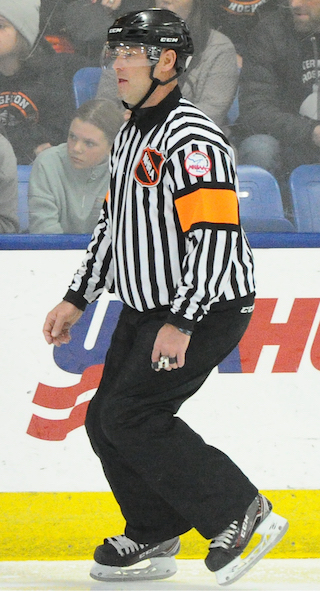 Their games lined up on just a few occasions in the NHL, and the two lobbied hard to have McCauley work Smolinski’s 1,000th career game in his final season with the Canadiens in 2007-08. The request, sadly, was denied by the league.
Their games lined up on just a few occasions in the NHL, and the two lobbied hard to have McCauley work Smolinski’s 1,000th career game in his final season with the Canadiens in 2007-08. The request, sadly, was denied by the league.
On the rare occasions when the friends did share the same ice, less than a handful by Smolinski’s count, it was McCauley who was forced to rebuff any attempts at fraternization. It’s just part of an official’s edict.
“For both of us, it was amazing; it was just great,” Smolinski said. “I’d say, ‘Hey man what’s up?’ and he says, ‘Can’t talk.’ I’m like, ‘What do you mean, we talk all the time.’ Again, he’s like, ‘Can’t talk, get away from me.’ You know, it was just business.”
McCauley then reached the 1,000-game plateau himself in 2018 and is still going strong as a regular selection for playoff duties with nine Stanley Cup Finals assignments, including last year.
So, it should have been natural for Smolinski to go to his old friend immediately for officiating pointers once he joined the ranks, right? Well, maybe not immediately.
“I talk to Wes all the time, but I actually hid it from him right out of the gate because I didn’t want to take his razzing. Eventually it got out, and he was loving it. He started sending me whistles and visors and pants,” Smolinski said, grinning. “And none of it fit, you know, because I’m older and fatter, and he’s so damn skinny. So, I still had to go out and get all new gear.”
Both Sides Now
Having been to the top of his profession, now moving to the other side of that same mountain that his friend McCauley scaled, the respect has grown for those blowing the whistle.
“The preparation for officiating is much more mental,” Smolinski said. “Way more rules oriented. You’re always trying to get away with things that you can as a player; now you have to police that.”
Smolinski has a distinct advantage.
“I know everything they’re trying to do because I’ve done it. I know where you’re going with the puck, I know what kind of breakout you’re trying to do,” Smolinski said. “I have all the instincts, now I just try to stay out of the way and not ruin their game. The most fun is watching the game develop and the ups and downs. For me to be out there and enjoy it with them, that’s the fun part.”
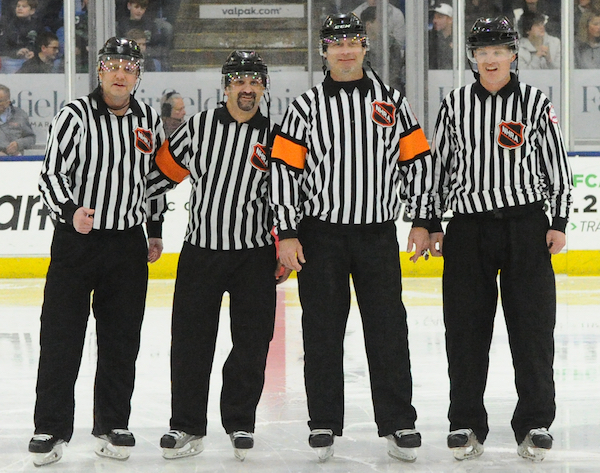 Those who have played hockey at any level have a built-in advantage should they consider the officiating avocation: the ability to skate. Unlike officiating in any other sport, skating is a prerequisite. This makes the pool limited, and almost solely composed of former players. Smolinski offers this advice.
Those who have played hockey at any level have a built-in advantage should they consider the officiating avocation: the ability to skate. Unlike officiating in any other sport, skating is a prerequisite. This makes the pool limited, and almost solely composed of former players. Smolinski offers this advice.
“I prefer sticking with high school because I think there’s more decorum, more administrative structure. Kids are playing for their schools, there’s loyalty there,” said Smolinski. “And there is more accountability. People need report to athletic directors and supervisors. Other levels can be more loosely governed, or a bit more maverick in nature. Moms and dads get involved more, coaches maybe know a little less,” said Smolinski.
He has, in fact, worked a handful of non-school games, and there’s a stark difference.
“I wanted to see what was going on, and I see it first-hand,” Smolinski said. “There are some crazy people and parents out there, and these guys are getting absolutely tortured. I’ve been tortured. There has to be a level of respect for what officials do. I think schools can rein that in a little more. All the guys I’ve met give up a lot of time and work hard because they love to do it and love the game.”
All sports need an assist from school administration and from those who once played the games to keep the officials recruitment moving in the right direction. People like Smolinski can help.
“He clearly doesn’t need to do this, and that’s what makes it so fantastic,” DiCristofaro said. “We need more people who have played – at any level – to do what he’s done and stay in the game as officials.”
Smolinski continues to promote the game in other ways as well. Currently, he is involved in the NHL’s Learn To Play initiative, which aims to inspire youth and welcome more families into the hockey community.
“We work hand-in-hand with the NHL Players Association for player development and industry growth,” Smolinski said. “Ages 5 to 9 are introduced to hockey, get head-to-toe gear and instruction, and meet some former players.”
The idea is to have fun first, which can translate into years and maybe even a lifetime in the sport. It’s a lifetime that has given Smolinski so much and continues to do so as he watches it unfold for others from his new vantage point.
PHOTOS (Top) MHSAA official Bryan Smolinski signals during Friday's Division 1 Semifinal between Brighton and Hartland. (2) Smolinski, a retired NHL standout, communicates with the Bulldogs' bench. (3) Smolinski keeps watch during game play. (4) Smolinski, third from left, with his crew: Michael Andrews, Kevin May and Thomas Robbins.

